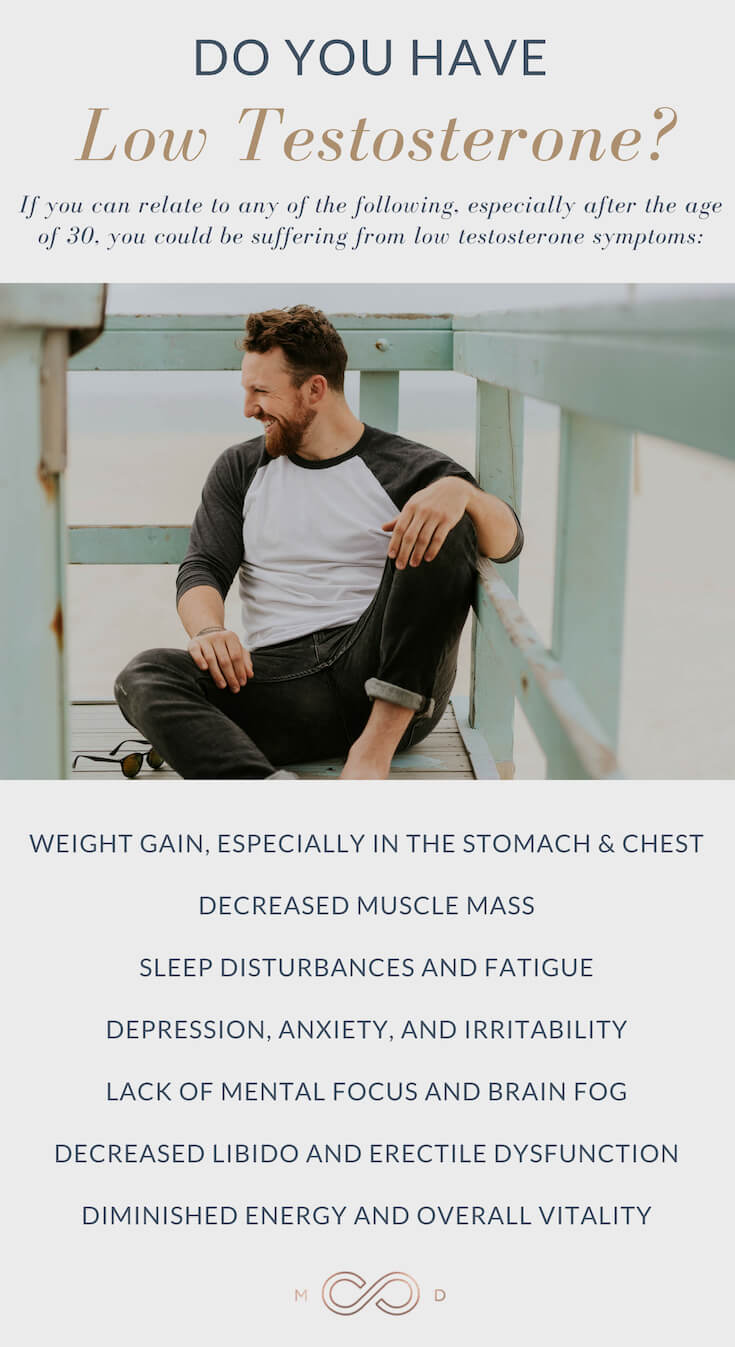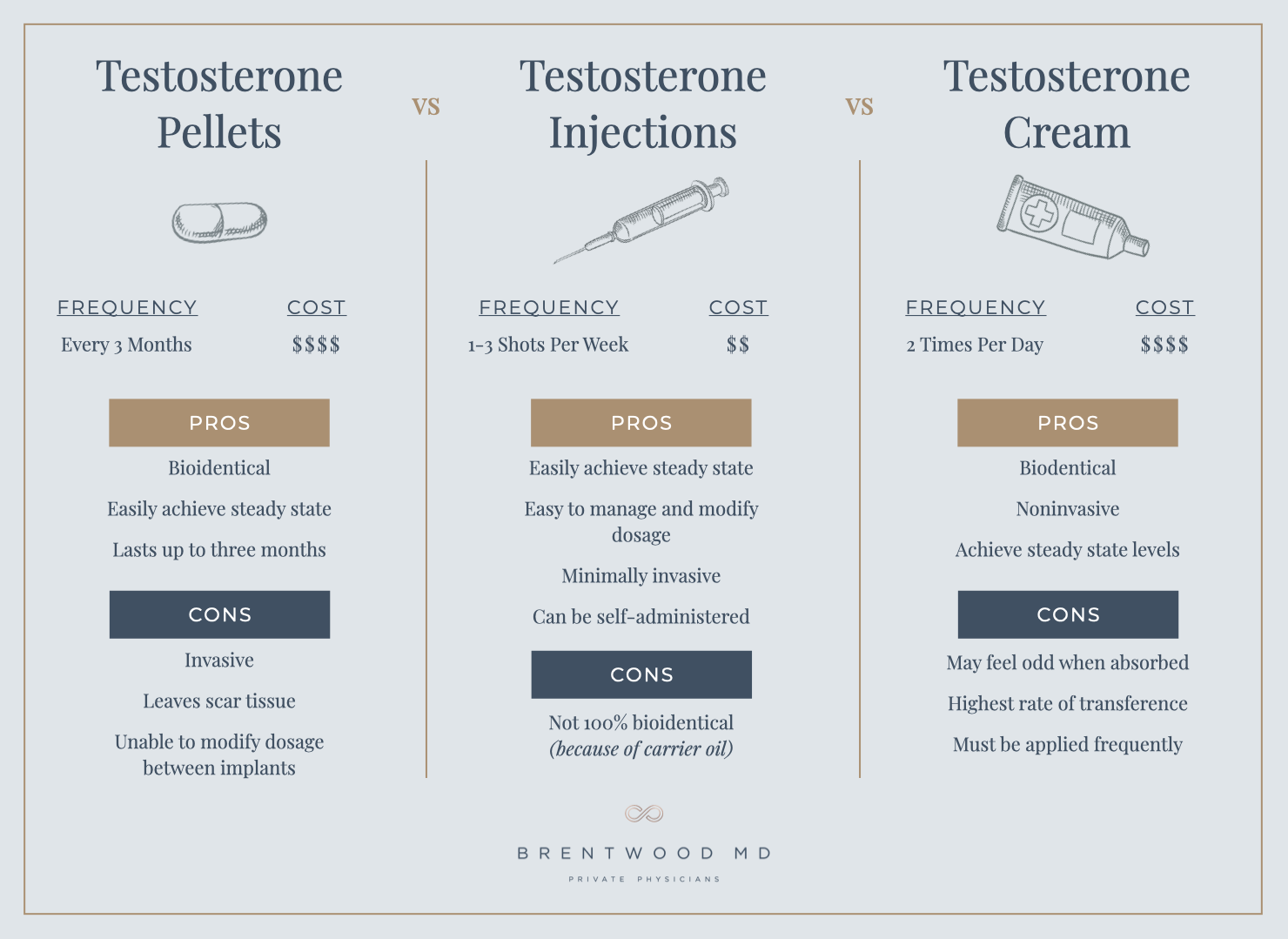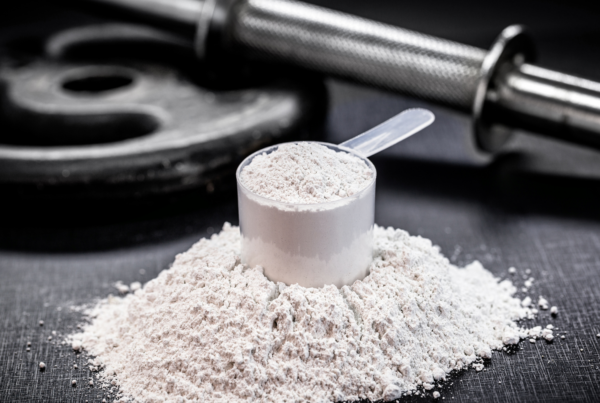As a man in your twenties and early thirties, you probably had the energy, desire, and strength to follow your passions and enjoy a fulfilling life. However, now that you are entering your thirties or forties, you may start noticing some unwelcome changes.
Do you feel more tired than normal? Perhaps you’re struggling with unusually low libido, weight gain, or brain fog. You may assume that these are just the natural and unavoidable consequences of aging, but the truth is that low testosterone levels could be to blame.
Your body’s testosterone production decreases over time and triggers unwanted symptoms that hinder your quality of life. Fortunately, this is within your control. Using a combination of healthy lifestyle changes and bioidentical hormone replacement therapy (BHRT), or testosterone replacement therapy, you can counteract low testosterone and start to feel like the best version of yourself once again.
What is Testosterone?
Testosterone exists in both the male and female body, but it’s best known for its role as an essential male sex hormone. Testosterone is so important that the National Institutes of Health labels it “the most necessary male hormone.”
A man’s testicles produce testosterone as part of a larger group of male hormones called androgens. The brain and pituitary gland are responsible for controlling how much testosterone the testicles produce. This is a significant task since testosterone is responsible for controlling critical functions throughout the male body:
- libido
- bone mass
- red blood cell production
- muscle mass
- fat distribution
- sperm production
Like all hormones, testosterone experiences its own life cycle of production from pre-puberty through old age.
The Life Cycle of Testosterone
Boys begin to experience accelerated testosterone production around the age of 10 or 11. It’s common for boys to experience a 30-fold increase in testosterone production during adolescence. Such a dramatic boost in testosterone triggers significant physical and behavioral changes, including deepening voice, more lean body mass, growth of body hair, and enhanced sexual response.
Adolescent boys maintain high testosterone levels into their twenties until a peak around age 22. It’s during this time that men feel their fastest, strongest, most passionate, and most energetic. Men of this age can easily perform physically and sexually thanks to the abundance of testosterone driving their body functions.
However, despite this tangible rise in testosterone levels throughout adolescence and early adulthood, most males experience a decrease in testosterone by about 1% every year after the age of 30. Their bodies change subtly over time as physical energy, strength, and stamina decline.
By age 45, most men begin to notice the effects of low testosterone. In addition to sexual dysfunction and weight gain, it’s common for men to experience high blood pressure, high cholesterol, and depression as a result of low testosterone production.
The problems associated with low testosterone become increasingly obvious over time. By the time men enter their 60’s and 70’s, their bodies only have a fraction of the testosterone they once enjoyed.
Do You Have Low Testosterone?
Low testosterone is a common problem among men over the age of 30. In fact, it is estimated that four to five million men in the U.S suffer from this condition also known as “Low T”.
It’s easy to assume the symptoms of your low testosterone are signs of general aging, but don’t be fooled. Aging can’t be stopped, but Low T can be treated and reversed with testosterone replacement therapy.
If you can relate to any of the following, especially after the age of 30, you could be suffering from low testosterone symptoms:
- Weight gain, especially in the stomach and chest
- Decreased muscle mass
- Sleep disturbances and fatigue
- Depression, anxiety, and irritability
- Lack of mental focus and brain fog
- Decreased libido and erectile dysfunction
- Diminished energy and overall vitality
If you suspect that you may be one of the millions of men coping with low testosterone levels, what should you do now? The answer is easy. Schedule an appointment with your concierge doctor to check your testosterone levels and discuss testosterone replacement therapy.
Testing Your Testosterone Levels
Testosterone exists in the body in many different forms, so it must be tested in two different ways: free testosterone and total testosterone.
Total testosterone is also known as serum testosterone because it is measured through blood serum testing. Your total testosterone level provides an overall profile of your testosterone count. Your doctor can use this test to effectively assess whether you could benefit from bioidentical hormone replacement therapy treatment.
Free testosterone, on the other hand, only accounts for 2% of all testosterone in your body. It is the small portion of testosterone that moves readily through the cells that need testosterone to function properly. A simple blood test can measure your free testosterone level and help your concierge doctor identify the best treatments to reverse your symptoms.
What Causes Low T?
Low testosterone is a topic that every man wants to talk about, but few know how to begin the conversation. By understanding the potential causes of low testosterone symptoms, you can approach your doctor and have an open and honest conversation about your age, your body, and testosterone’s influence on your health.
Low T Is Based in History
At its core, low testosterone is actually influenced by our history. In the past, men rarely lived beyond 40 years old. They learned a trade, procreated, taught their offspring their trade, then died. Even in 1950, the life expectancy in America was 42!
It’s been less than 100 years since human longevity became common, and our bodies simply haven’t caught up. Testosterone still declines at the age when men would have normally reached the end of their lives.
Health Conditions Hurt Testosterone Production
Diabetes, obesity, chronic stress, and poor lifestyle choices all have the potential to minimize testosterone production and send your levels plummeting.
The link between diabetes, obesity, and low testosterone is backed by plenty of research. Testosterone helps the body properly use blood sugar in response to insulin, so less testosterone triggers imbalanced blood sugar levels.
It’s also true that obese men are more likely to have low testosterone. Fat cells also produce estrogen, which further compounds lower testosterone levels in obese men. Obesity also reduces the amount of SHBG found in the blood, which in turn reduces how much testosterone can be transported through the blood.
Chronic stress is another major factor in low testosterone. Ongoing stress leads to abnormally high levels of cortisol in the blood.
Cortisol is an important hormone, but it becomes dangerous in high quantities. Too much cortisol leads to weight gain and increased risk of diabetes, both of which further hurt testosterone production.
Benefits of Boosting Testosterone
With so many negative impacts of low testosterone levels, it’s no secret that boosting testosterone will improve your health. If you work with your doctor to make healthier lifestyle choices and receive BHRT, you can expect to enjoy the following health benefits of your boosted testosterone levels.
Increase In Sexual Desire and Performance
Testosterone is best known for its ability to increase sexual desire and performance. There are three layers to sexual performance that should be considered: physical “plumbing” and anatomy, libido, and your relationship.
The first layer of sexual performance, the plumbing that enables erections and sexual response, is vulnerable to more than just low testosterone. Reduced blood flow to the penis is the most common cause of erectile dysfunction. Diabetes, high blood pressure, high cholesterol, obesity, and other chronic conditions can all cause reduced blood flow. This is why it’s so important to improve your overall health to enjoy the best results from higher testosterone levels.
The second layer of sexual performance, libido and desire, are most dramatically impacted by higher testosterone levels. With more testosterone in your system, you’ll experience the physical and mental libido boost that you need to enjoy enhanced sexual pleasure.
The third layer of sexual performance revolves around your relationship. If your intimate moments occur with a person with whom you are experiencing conflict or relationship issues, you may experience the higher sexual energy created by testosterone without a satisfying outlet. This is why it’s so important to discuss your testosterone therapy options with your doctor. He can help you make a holistic, fully informed choice to best improve your quality of life.
Natural Antidepressant
Testosterone doesn’t just improve your sex life- it also functions as a natural antidepressant. The changes caused by low testosterone often cause men to lose their self-worth and feel less confident in their abilities. Since higher testosterone levels can restore lean muscle mass, reduce weight, boost sex drive, and encourage many other positive changes, it naturally improves mood and reduces feelings of depression and anxiety.
Increase Lean Mass While Reducing Visceral Fat
Testosterone is responsible for building lean muscle mass. Low T prevents the maintenance of lean muscle mass and causes weight gain instead, but increasing your testosterone reverses this phenomenon. Higher testosterone levels enable the body to continue building lean mass while also stopping the insulin resistance associated with visceral fat accumulation and diabetes. For best results, combine testosterone therapy with weight training and regular exercise.
Reduce Risk of Heart Attack and Stroke
It’s true that healthy testosterone levels can even improve your cardiovascular health. Since testosterone helps red blood cell production, it also helps the heart pump healthy, oxygenated blood throughout the body. Research supports the idea that testosterone reduces cardiovascular problems: a study of 83,000 men concluded that men who restored healthy testosterone levels were 24% less likely to have a heart attack and 36% less likely to experience a stroke.
Lower Risk of Alzheimer’s Disease
A growing body of research suggests that testosterone has the power to reduce your risk of Alzheimer’s disease. It is now believed that Alzheimer’s is largely triggered by insulin resistance in the body. Since testosterone is such an effective mechanism to reverse insulin resistance, it can potentially protect men from the development of dementia.
Reduce “Bad” LDL Cholesterol
As part of its heart-healthy benefits, balanced testosterone can even reduce the “bad” LDL cholesterol in your system. This occurs as a fortunate side effect of insulin resistance reversal and improved lean body mass. A healthier body can produce more of the “good” HDL cholesterol that lowers triglycerides and eliminates dangerous LDL cholesterol through the liver.
Minimize Inflammation
Testosterone is a key hormone for muscle growth and rejuvenation, which also equips it with anti-inflammatory properties. Testosterone can facilitate healing and growth, especially in the muscles, which reduces inflammation and helps you feel less pain after an injury.
How to Boost Testosterone
If you are enduring the consequences of low testosterone and want to take action to boost your testosterone levels, work with your doctor to improve your lifestyle habits and initiate bioidentical hormone replacement therapy.
Healthy Diet and Exercise Habits
Your exercise and eating choices can influence your testosterone levels, so adjusting your daily habits can quickly and easily improve low T.
You can begin to improve your natural hormone production by eating more healthy fat sources in place of sugars and carbohydrates. Healthy fats for testosterone include saturated fats, omega-3 fatty acids, and monounsaturated fats like these:
- Coconut oil
- Raw dairy products
- Salmon
- Seeds and nuts
- Avocado and olive oil
Don’t overlook the importance of exercise, either. High intensity interval training and weight training both induce testosterone release in the body. As your body burns stored sugar and fat, you’ll lose weight, improve your circulation, and regain your vitality.
Bioidentical Hormone Replacement Therapy
Bioidentical hormone replacement therapy (BHRT) is the formal medical treatment for low testosterone. BHRT replaces the same exact molecule that your body is under-producing, rather than using an artificial chemical that poses risks of its own.
It is important to discuss your BHRT options with your concierge doctor. The right treatment method can help you enjoy significant improvement in your symptoms- and quality of life- after just four to six weeks!
Testosterone Replacement Therapy Applications Compared
Testosterone pellets, injections, and creams are all commonly used to help men overcome Low T, but it’s important not to select your application blindly. Understand the benefits and drawbacks of each before making a decision.
Testosterone Pellets
These small, rice-sized hormone pellets are implanted under the skin to release a slow, steady stream of testosterone over the span of about three to six months.
Pros:
- Bioidentical hormone mimics the behavior of natural hormones
- Steady flow of hormones, no “rollercoaster” effect
- Lasts longer than other therapies
Cons:
- Inserted under the skin, which may cause bruising or soreness
- Young patients may develop scar tissue if using for decades
- Dosing can only be modified every three months, not in the short-term
- More expensive than other options
Testosterone Injections
Testosterone injections offer a fairly simple way to release testosterone into the bloodstream using a shot one to three times per week.
Pros:
- Easy to achieve a steady-state by releasing testosterone into the bloodstream quickly
- Easy to manage and modify dosing by the day or week
- Least expensive
- Easy to self-administer
- Minimally invasive
Cons:
- It’s a shot (and many people don’t like shots)
- Not completely bioidentical because the testosterone is contained in oil
Testosterone Cream
Testosterone cream is applied topically twice a day to release testosterone into the skin.
Pros:
- Bioidentical
- Non-Invasive
- Achieve steady-state levels quickly
Cons:
- May feel odd when absorbed
- Highest rate of transference-by-touch to children or spouse
- Must apply twice a day, every day
- Expensive
Common Myths About Testosterone
It’s all too easy to find erroneous and misinformed discussions about testosterone. These four myths are a few of the most prevalent that need to be debunked.
Myth #1: Testosterone Causes Heart Attacks.
A great deal of confusion exists over the correlation between heart attack risk and testosterone replacement. However, 50 years of studies show no direct correlation or causation of cardiac event with bioidentical testosterone replacement. In fact, all of the data suggests that testosterone is cardioprotective.
Myth #2 – Testosterone Causes Prostate Cancer
Testosterone does not cause prostate cancer, but it can make it worse if you have active disease. The truth is though, having low testosterone levels is a risk factor for developing prostate cancer.
Men with active prostate cancer should not, under any circumstances, take testosterone. However, if you have recovered from prostate cancer and you are cancer-free with a prostate specific antigen (PSA) level less than 1, you can move forward with confidence that there is no increased risk of worsening your prostate cancer.
Myth #3 – Men Taking Testosterone Need to Block Estrogen
Excess testosterone is converted to estradiol, a form of estrogen. It is a common teaching that you should block excess estrogen in men taking testosterone, but this is because of poorly executed and poorly interpreted studies that showed high levels of estrogen increase heart disease risk. However, estradiol is actually cardioprotective.
Myth #4 – Testosterone Causes Blood Clots and Strokes
In men taking testosterone, the iron-containing molecules that transport oxygen called hemoglobin and hematocrit begin to rise. Some providers suggest that men on testosterone should give blood to prevent blood clots or strokes due to these high iron counts. However, iron doesn’t make clots – platelets do. Men who are on testosterone have no change in platelets, they are just making more iron.
How To Find a Good Testosterone Clinic in Nashville
If you’re ready to boost your testosterone levels, it won’t be difficult to find dozens of testosterone clinics competing for your time and money. However, testosterone therapy isn’t a one-size-fits-all treatment. You need to find a reliable and experienced physician who’s willing to take you on a holistic hormonal optimization journey.
To enjoy the very best results, you need a doctor who doesn’t tackle hormone problems as if they exist in a vacuum. Testosterone levels are affected by countless physical, environmental, and genetic factors, so unless your doctor takes a comprehensive view of your health, you may never truly solve your deficiency.
The best doctor of testosterone replacement therapy in Nashville will also offer his complete dedication to helping you become the healthiest version of yourself. Not just a normal version of average, but an optimized version of health that allows you to fully enjoy life and thrive in your own body.
This type of doctor will take the following comprehensive route to boosting your testosterone levels:
- Evaluate your testosterone levels after testing
- Consider your levels compared to how you feel
- Explain each treatment option, along with its pros and cons
- Listen carefully to the changes you experience during treatment, and adjust if needed
- Check in regularly to help you continue reaching your unique goals and overcome challenges
A concierge doctor like Brentwood MD is able to provide hand-crafted care to optimize your health while still working quickly and privately to meet your needs. Rather than visiting a doctor who will rush through your treatment and push you out the door, the concierge services at Brentwood MD help you develop a meaningful relationship with your doctor.
Brentwood MD understands that true insight leads to optimal health, which is exactly why we offer best-in-class concierge medicine to the greater Nashville, TN area. Our members are treated like family. Meet with us today to enjoy the peace of mind that only comes from being connected to a compassionate physician who knows you by name.

Dr. Aaron Wenzel is a concierge physician specializing in the care of fast-moving entrepreneurs, executives, and public figures in the Nashville, TN area. Dr. Wenzel’s diverse life experience and extensive training in family medicine, emergency care, nutrition, and hormone replacement therapies give him the unique platform to provide unmatched care for his patients.









